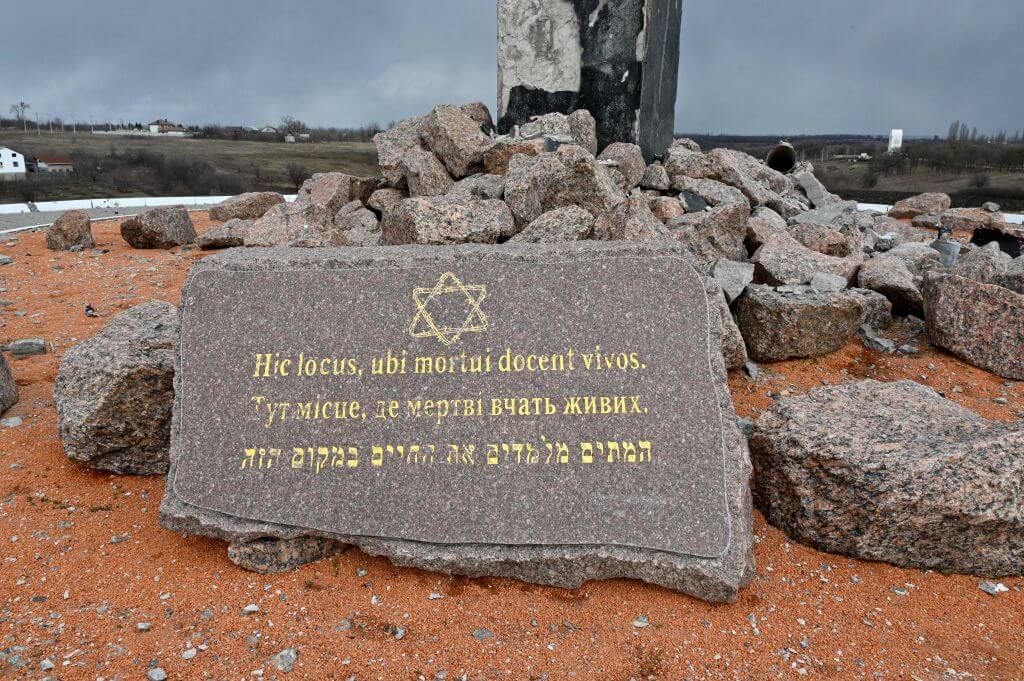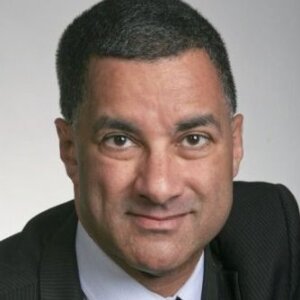‘Ya Ukrainets’
‘I am Ukrainian’: With war, Jews of Ukrainian descent embrace their identity

A plaque at the Menorah memorial at the entrance of the Drobitsky Yar Holocaust memorial complex in the eastern outskirts of Kharkiv, set on the place of a mass killing of Jewish people by Nazis during WWII, on March 27, 2022, a day after it was damaged in a Russian shelling. Photo by Sergey Bobok/AFP via Getty Images
My daughter introduced me to my now-son-in-law, Gene Pelikhov, a little over a dozen years ago. One of the first things she told me was that he and his family were Russian Jews.
They identified that way until the invasion of Ukraine.
“Ya Ukrainets” (“I am Ukrainian” — transliteration per Google), Gene said days after the invasion, when I asked him to describe himself and how to pronounce it in Ukrainian. He qualified that, adding: “I did not expect myself to be as pro-Ukrainian as I am now.”
He’s hardly alone. The contrast between the horrors of the Russian offensive and the resolve of the Ukrainian people, to say nothing of the Churchillian leadership of Ukraine’s Jewish president, Volodymyr Zelenskyy, has put practically the whole world in the besieged nation’s corner.
For Jews from the former Soviet Union, though, the journey is more complicated. Hailing from Dnipro, the Pelikhovs learned early on not to conflate “Jewish” with “Ukrainian.”
“We were not identified as Ukrainian from birth, but as Jews,” said Gene, who at 44, was born more than a dozen years before the fall of the Soviet Union and Ukraine’s independence in 1991. “I was taught many lessons growing up — that I was not a Ukrainian. I was a Jew.”
That was emblazoned on official Soviet documents such as passports, he said, on which Jews were classified as an ethnic group, not members of a religion. It was also driven home in the attitudes, if not blatant antisemitism, of non-Jewish Ukrainians.
“There’s not a lot of love lost between me and Ukrainian people,” he said — adding non-Jewish Russians didn’t leave him with warm feelings, either.
If Gene’s unpleasant memories were largely in childhood — the family left and settled in Massachusetts when Gene was 18 — his father, Eugene, had decades more experience as an outsider in his native land.
“That’s why we were refugees,” Eugene told me of the reasons why they left.
“I can say I’m very proud to be Ukrainian. It was different before,” he continued, preferring to talk about the present. “We respect Ukraine not only because of our roots there, but because the people want real freedom. They strive for real democracy. They saved the country.”
The newfound Jewish Ukrainian pride isn’t limited to those who were born in the country, as my neighbors in the greater Duluth, Minnesota, area attested. Charlie Glazman of adjacent Superior, Wisconsin, realigned his family’s national heritage when watching the news early in the war. A Black Sea town he saw in the report was his “Russian” grandfather’s birthplace.
“Growing up in Duluth, whenever people asked about my heritage, I always replied it was Russian,” he said. Now enlightened, he said, “We’re Ukrainian more so than Russian.”
The swirl of human history is replete with cross-cultural interactions, meaning even if all four of your grandparents were of the same strain, it’s unlikely their grandparents were. With that, anyone can claim an ancestral antecedent to find pride in — or disown.
Duluth’s Ellen Sandbeck, who also has gone from describing part of her lineage as “Russian Jewish, from Ukraine” to “Ukrainian Jewish,” said her clarification has nothing to do with pride, which she termed “a dangerous emotion.”
“I don’t actually do pride very well,” she said, “and don’t actually understand the concept of being proud of something I had nothing to do with, like being born.”
Pride took a tumble in my own family tree. Included is a long line of German Jews who were unapologetically prejudiced against Jews from Eastern Europe. Allowed in their company was my great-grandfather, Morris Rosenzweig of Philadelphia, who Census records in the early 1900s documented as being from England.
My genealogy work stumbled on a secret, however: In an 1898 patent application for “an amusing puzzle” he’d invented, Rosenzweig was described as “a subject of the czar.” Earlier Census records confirmed his Russian nationality before his reinvention as British.
So where was he from in the then-Russian Empire? I have no idea, but given Jewish immigration at the time, there’s as good a chance as any it was Ukraine.






















